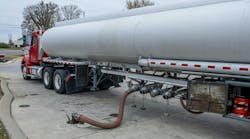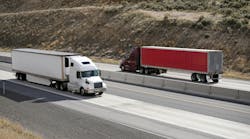PUERTO VALLARTA, Mexico. As Flavio Rivera puts it, Mexico is about to enter a “new stage."
One reason for the comment by Rivera, president and CEO of Daimler Commercial Vehicles Mexico, is the inauguration of new President Andres Manuel Lopez Obrador on Dec. 1.
But as he met with the North American trucking media on Nov. 29, he also spoke of a modernization underway within Mexico’s trucking industry, fueled in part by updated emissions regulations scheduled to take effect during 2019.
There are new challenges and “opportunities to do new things every year,” Rivera said. “2019 is not going to be an exception.”
Daimler’s presence in Mexico includes 8,000 employees, two truck manufacturing plants, and a bus assembly facility. The company’s market share percentage in Mexico has risen by double digits in recent years, with Classes 4-8 topping 37% so far in 2018. Class 8 market share is at 38.5%.
Rivera noted one of every five trucks sold in Mexico is a cabover, including about 45% of the medium-duty sector. At a similar event one year ago, Rivera first spoke of the move toward the cabover, and announced Daimler was adding two new options within the country - the Class 6 model 1217 and the Class 8 model 2528.
Beyond the appeal of cabovers, there is also a growing appetite among Mexican fleets for greater fuel efficiency to combat high diesel prices.
To better support those fleets, Daimler earlier this fall rolled out the Cascadia for the Mexican market, offering many powertrain and telematics options already available in United States. Rivera said this truck will help “revolutionize the [trucking] industry in Mexico.”
It is an industry still plagued by an average fleet age of 17 years, with some trucks still on the road more than three decades old.
Overall, Rivera said, an estimated 69% of 530,000 Classes 4-8 trucks in Mexico currently do not meet the U.S. Environmental Protection Agency’s 2004 emissions standard.
That is going to begin to change in the coming year, as new trucks built for the Mexican market starting July 1 will need to meet either the 2010 EPA rule or the similar Euro5 standard.
In order to transition to these models, Mexico’s petroleum industry is in the process of transitioning to 100% ultra-low-sulfur diesel (ULSD) and the use of diesel exhaust fluid or urea.
This transition is a “big challenge in Mexico,” said Fernando Paez owner and CEO of Olympic Transport. The 29-year trucking veteran expressed some concern that Pemex and other fuel companies would actually be able to continually provide the high-quality fuel.
However, both Paez and Rivera were both optimistic about the new Mexican government, noting there have been positive economic signs in the months since the election.
They also expressed optimism with the progress made during 2018 with the updated North American Free Trade Agreement, often referred to as the U.S.-Mexico-Canada Agreement. Neither believed it would cause any major changes to cross-border trade or overall manufacturing plans.
A day after their comments, the United States, Canada, and Mexico signed the trade deal, though it still needs to be formally ratified by lawmakers.




